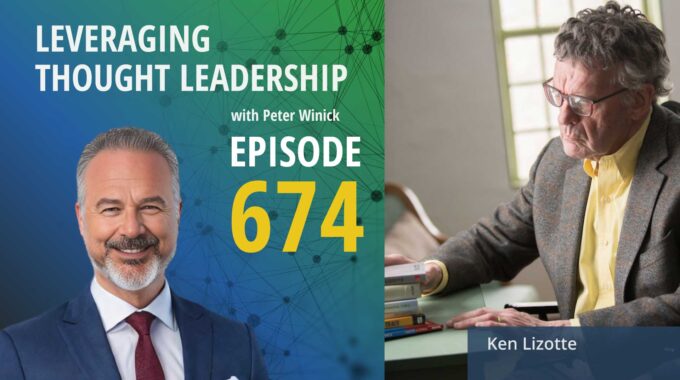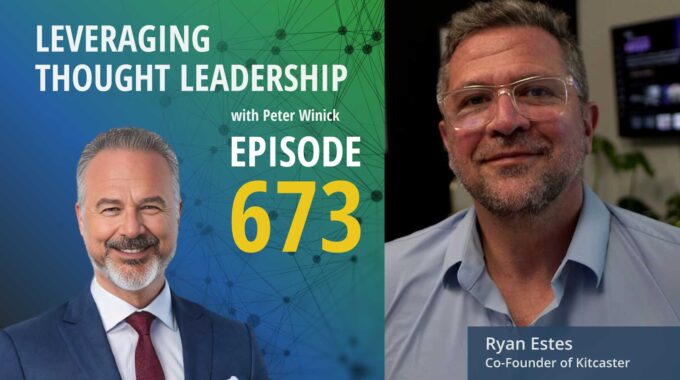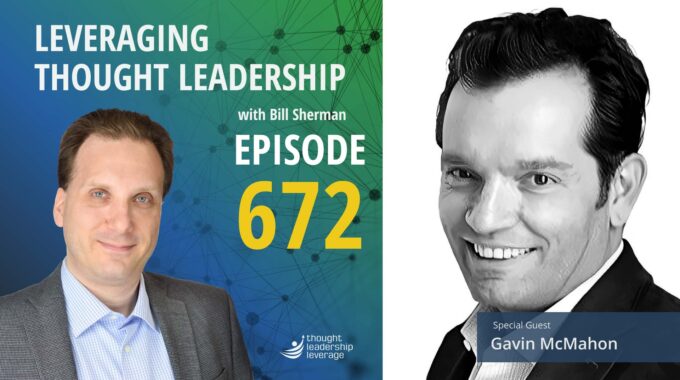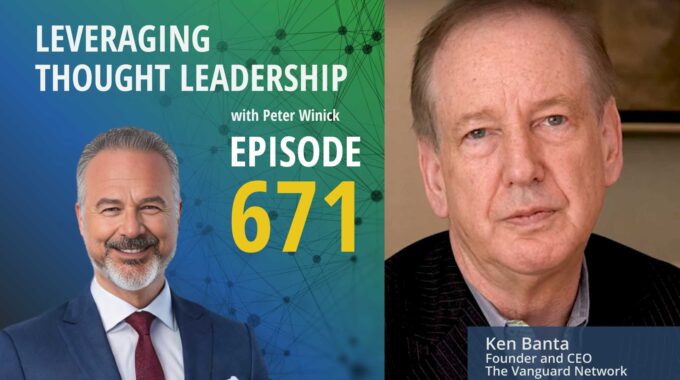Why Great Thought Leaders Don’t Play the Publisher’s Game Peter talks with publishing expert Ken…
Purpose vs. Meaning in Brands | Dr. Martina Olbert
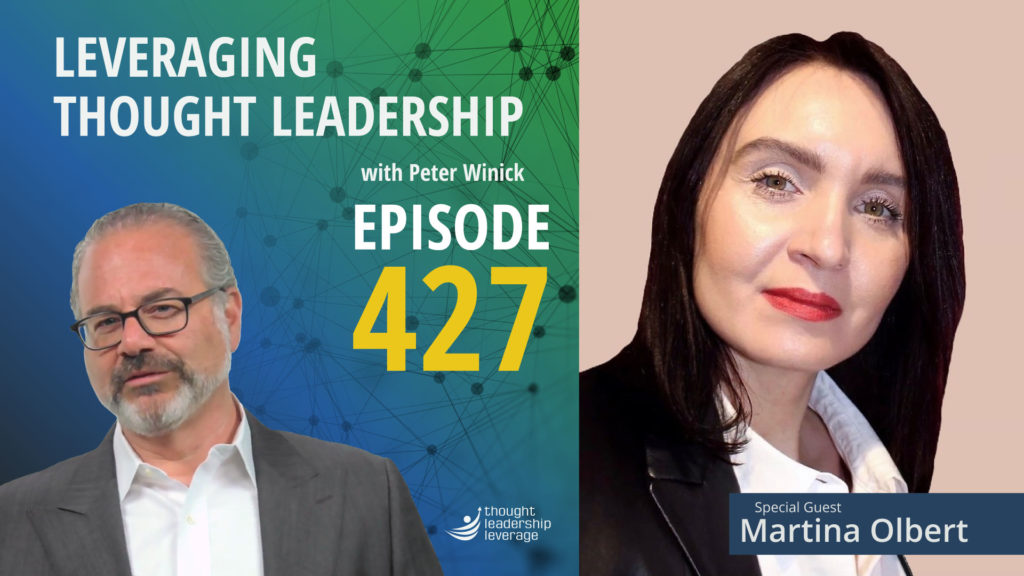
How brands can shift advertising to meet new needs of customers.
An interview with Dr. Martina Olbert about how the pandemic has created a humanistic paradigm that is changing the way we see brands.
When it comes to the “higher purpose” of your brand or organization, how much control do you have on either versus the values customers will place on them?
Today we will examine the impact COVID has had on how consumers see brands and the value we place on them. To get a better understanding I’ve invited Dr. Martina Obert to join me. Martina is the CEO of Meaning Global, an expert strategy consultancy helping leaders envision new possibilities for future innovation, value creation, and growth. She is also recognized by Forbes as The Meaning Expert™.
Martina explains how COVID created a shift in the marketplace that moved emphasis from brands to the people they serve. The feeling of being “stuck” was pervasive, and led many consumers into a period of self-reflection about themselves, their lives, and their goals. This realignment of values has impacted advertising, and to be successful, brands today need to more to deliver appreciable, meaningful value.
Brands and organizations often promote meaning and purpose, but what does that mean — and how much control do they really have over their audience’s perception? Martina shares stories about how our values impact the perception of our brands, and what audiences look for when choosing to buy.
This is a fascinating conversation about the rise of the ‘humanistic paradigm” and how brands, organizations, and advertising are having to change in its wake.
Three Key Takeaways:
- Organizations need to consider how to fundamentally improve customers’ lives with their advertising, and align with each person’s sense of greater meaning.
- COVID-19 has made the emerging humanistic paradigm more profound and cohesive.
- When starting out in thought leadership, find your niche! Hint: It’s the thing you are more passionate and knowledgeable about than anyone else!
If you need a strategy to bring your thought leadership to market, Thought Leadership Leverage can assist you! Contact us for more information. In addition, we can help you implement marketing, research, and sales. Let us help you so you can devote yourself to what you do best.
Transcript
Peter Winick And welcome, welcome, welcome. This is Peter Winick. I’m the founder and CEO of Thought Leadership Leverage, and you’re joining us on the podcast today, which is Leveraging Thought Leadership. Today, my guest is Dr. Martina Olbert. She is the world’s leading expert on creating meaning in business. Now, we could stop there with her bio because I think that’s fascinating enough, but I’ll have high level quotes there. She’s recognized by Forbes as a global authority on brand meeting. Brand meaning she’s a business visionary thinker, strategy advisor, humanist futurist, consumer psychologist and social scientist, reimagining business, and brands as the driving force for a more meaningful, humanistic future and new sustainable economy. And obviously, she’s got a consulting firm, she’s got a book that’ll be coming out in a year and a half, two years, and lots of other credits. So, let’s dive in. Martina, thank you for joining us today.
Martina Olbert Thank you. Thank you for having me. Peter, I’m sorry for that intro. That was a mouthful.
Peter Winick That was definitely a mouthful. Yeah. So, tell me what that means in English. Reimagining consumerism. Right? So, if we only had a very short elevator ride, what is it that you actually do? Tell me that.
Martina Olbert Well, that’s not actually what I do. Reimagining Consumerism, although that is the title of my latest study and latest paper that I published in the American Journal of Consumer Research. And the key idea really behind that was. That since COVID, we have been seeing this shift increasingly in the marketplace from brands to people. And I think that a lot of people in COVID are feeling this sense of being stuck. Right. We couldn’t go outside. We couldn’t of frozen in space and time. And when you’re sort of frozen in space and time and there is no time space continuum around you, the only way that you can actually go within work. So, I feel like a lot of people did that. And with this we reevaluated our needs, our lives, our lifestyles and what it is that we actually want to do. And why are we just going on this rat-race every day and what is it giving us and why are we just predominantly focusing on this idea that we are here to consume, consume, consume and be on autopilot and really not enjoy our lives and being maybe stuck in dead end jobs. And we started like reconnecting with our essential needs and values with our essential sense of self. And with that, I feel like there has been this split or we have been sort of yanked out of this collective hypnosis, if you like, or this illusion of consumerism, which basically conditioned us to believe that the more you buy or the more you sort of identify yourself with this idea or this visionary imaginary spell that you see in the advertising, the more you will be happy, the more you will be satisfied with your life and stuff like that. So, and we are now seeing that it’s not true. So, I mean, we already know that it’s not true, but we were sort of still running, running on this autopilot. And now we are – we basically stopped doing that.
Peter Winick So yeah, so, so, so stay there for a moment because we’ve got, you know, the entire purpose of advertising for the most part is to convince us that we have a need that we didn’t know we had. Right. And then obviously to spend it. So, there’s that’s one macro force that pushes us this way. Then there’s just human nature that keeping up with the Joneses. I want a bigger car, bigger house, better this than my neighbors, or even intrinsically, you know, it’s the way we keep score. I get more stuff, right. And then, like you said, we had with COVID and the stuff that we never thought about because we always had it, we couldn’t get the basic food. Absolutely. The paper or whatever. And you’re like, wait a minute, what’s the point of the big fancy car that I’m not using? What’s the point of all this stuff I’m wearing? Sweatpants.
Martina Olbert Yeah, you know. Exactly. Exactly. And I was just talking about this at the luxury conference, actually. What’s the point of all of your Birkin bags and Gucci loafers and dresses if all that you do is just go from bedroom to kitchen? You know, there is no luxury in those items anymore because the luxury becomes that I’m healthy, that I have a sense of well-being, that I have peace and know that everybody is happy, that I have a meaningful relationship with other people that I care about, that I know who I am and what I want to do. Okay.
Peter Winick But when you talk about those things, so this is sort of the gist of sort of this humanistic realignment, which is which is sort of your current work in your space and where it’s coming into you. So, I would imagine that the advertising world doesn’t necessarily benefit from that. And therefore, everything, the whole ecosystem of what is supported by advertising, social media, television, media, I mean, there’s lots of it’s not just the advertising, it’s everything that that supports. Right. How would you define what is what is humanistic realignment? What does that mean?
Martina Olbert Okay. So, wow, I don’t well, first of all, I touch upon the advertising and branding consumerism. I don’t actually agree fully. I mean, to a certain extent, yes. But I don’t agree fully that that would be like an existential threat to the whole advertising industry. Okay. What I’m proposing is not that we stop advertising altogether and telling basically marketing any products and telling people not to identify with them. That’s not exactly what I’m proposing. But I’m saying is that apart from using brand purpose and advertisements to inflate realities that are not really totally attainable, maybe think about ways to actually deliver real, meaningful value to people that fundamentally improves their lives and elevate their human well-being. So like add to that perspective and expand that perspective and maybe start thinking about what other forms of value can I create as a company that will meet those higher and more essential needs through innovation. So new product development through actually not forcing us into this reductionist box of you are a consumer and understanding that we are not here to be consumers of brands right to too much. In my third book, The Line The reverse is true. Businesses and brands are here to serve people as human beings, and they have to give out some kind of meaningful human value that that improves our life. Otherwise, why are we consuming something that is not good for us like that? That doesn’t really throw any sense.
Peter Winick Right. So, let’s talk about sort of the application of your thought leadership at the organizational level. If I’m a luxury brand, if I’m Gucci, I’m pretty happy selling, you know, a leather shoe that costs them $30 or whatever for $800. Right. Because that’s a pretty good business model if you can do it. And if I’m the consumer in the current or the previous sort of universe, there was something I got $800 worth of value or perceived value from the shoe because it’s got the little G logo. And I look, I feel cool or I don’t know what a prestigious when I’m wearing it it’s social signaling it whatever. How do you change the way you operate from a business perspective to align this this humanistic thinking.
Martina Olbert So great question. I would just maybe make a slight alteration. So luxury brands, luxury brands wouldn’t be the ideal example of this.
Peter Winick Okay. So, give me give me an idea exactly.
Martina Olbert Because of the fundamental reason that the whole luxury brand is based on meaning and the excess of symbolic value over the actual functional value of the product.
Peter Winick So what is where is the biggest.
Martina Olbert More of a functional. Yes. So what I’m thinking about right now are actually two really good opportunities for. For a big global corporation, and one of them would be in the beverage industry. For instance, I was thinking, why are we still selling people like chemically based sugary drinks? If we know already that they’re not good for us, they throw our metabolism out of whack. Sugar excess sugar increases inflammation. Inflammation leads to all sorts of things like has it? Why are we doing this? What? Like, why are we not using COVID as the new lens to see businesses and what people actually need? When we are going through a whole array of symptoms, including neuro neuropathy or, you know, long COVID or having brain fog and having like decreased mobility or performance. So for instance, why are we not using this as a lens through which to look at the world, to see the new opportunities for creating entirely new categories of products that will actually help us with performance, with nutrition, with optimizing.
Peter Winick But those two things are not mutually exclusive. So I would say great, yeah.
Martina Olbert Mostly they’re not there. And that’s why I said it’s an expansion of the current of the current way that we feed business and not it doesn’t necessarily mean that what we did back in the old normal will all still exist and we will all be just happy, go lucky and healthy and 100% just focus on performance. I mean, you know, people have vices. They like stuff that’s not good for them. Right. But we also equally need to be catering to the things that are good for us that are actually improving our wellbeing.
Peter Winick Yeah. And I was just saying that there’s a market for both. I mean the, the lifestyle, you know, someone might have a lifestyle where they’re, they eat healthy, they work out, they do great things, etc. Then they might say, you know what, you know, once a month, I like a Coke. I know it’s horrible for me and it’s full of sugar and all that, but once a month it’s not going to kill me. And it’s a vice I have or I want a candy bar or, you know, whatever. But most of the time, you know, I like to consume things that are healthier, or at least not destructive to who I am. So I don’t.
Martina Olbert Like to point unless it’s not like five liters a day.
Peter Winick Yeah, right. Exactly. Exactly.
Martina Olbert I mean, you are in charge of your own well-being. So that that is, I guess, the number one thing to say that that people are they be change agents in the world. I mean, it’s going to be old like your brand.
Peter Winick Right.
Peter Winick If you’re enjoying this episode of Leveraging Thought Leadership, please make sure to subscribe. If you’d like to help spread the word about our podcast, please leave us a review and share it with your friends. We’re available on Apple Podcasts and on all major listening apps as well as at ThoughtLeadershipLeverage.com/podcasts.
Peter Winick So one of the other things that you talk about and write about and think about is this this concept of purpose versus meaning, right? So there’s a lot of I would argue there’s a lot of noise out there. Yeah. Under both of those topics. And some of it is really marketing under the purpose banner, right? Because people claim to be more purpose driven or more meaning driven. But let’s start with in from your definition, what’s the distinction between purpose versus meaning?
Martina Olbert I think that the essential question. Yeah. No, and it is an existential problem that the whole purpose agenda in the industry. I feel like the simplest way to say it is that the purpose is the internal guidance for internal compass, for the brand or for for the organization. Meaning is the external right. That’s the external value that your customer sees and interprets based on what how they relate to you, how they identify with what you are doing and what it means for them in their own life and their culture.
Peter Winick So that’s more. So the organizations have more control over the purpose than necessarily the meaning I assigned to. It might be more subjective as a consumer. Is that.
Martina Olbert Well, yes or no? It can be. It can be subjective because every single person is an individual and has different values. But the other way around, though, Peter.
Peter Winick Okay. So if somebody if the meaning I assigned to it is more subjective. Right. How to? What is the purpose playing?
Martina Olbert The problem is that brands started using purpose as if that was the thing that people identify with and that is the thing that is important to them that they value. Like there has been this whole array of studies that say. The more you communicate with the purpose and the more is purposeful. And people can identify with your purpose and see what you do in the world. The more likely they are to buy your brand. But that’s not exactly true because people are not buying. The purpose of the organization, people are not buying your why they’re buying their own why they’re buying.
Peter Winick Their assigning a why to it. And that either aligns with.
Martina Olbert Exactly is the customer is the customers why it’s not the brand. Why? Right. Okay. So it’s not.
Peter Winick So the.
Martina Olbert Brand fundamental disconnect.
Peter Winick So if that’s true, the brand’s role is not to assign the purpose. I, as the consumer, assign a purpose or assign a meaning to why I’m buying. A over B or B oversea or whatever the case is. The role that it plays in my. Yeah. Okay. That makes sense. Talk about sort of what you’re seeing as a thought leader from a business perspective, because this is your business, this is what you do for a living. How is it changing and evolving now in this? I hate to say post-COVID, because every time I’ve said that over the last two years I’ve been around this current.
Martina Olbert We don’t know this.
Peter Winick Current phase of being in between phases of COVID. Yeah. So what is it that how does that impact your business? What are you doing differently? What are you doing more of today than you were a year or two ago? What you want to be doing more of in a year from now?
Martina Olbert Well, in my business, yeah.
Peter Winick Yeah, yeah. As a thought leader.
Martina Olbert I think it only really profoundly impacted what I see in the world and where I see that the industry is headed and the new ideas that I was able to tap into around this whole emerging humanistic paradigm, because I basically saw I saw little pockets of innovation or, you know, a little inside here and there. But it really hasn’t been as profound and cohesive, right, of a movement before that than it is now thanks to COVID and has us having gone through it as. Collective experience together. So I feel like. The COVID pandemic really has served as sort of an accelerator. Yeah, a business change, something that was very much needed, but will be wearing really globally on the same pace at the same time to make it right. And now there are sort of like nowhere to hide and we have to do it. Sustainability is coming much more to the forefront. Diversity is coming much to the forefront. Yeah, this whole beyond purpose mantra coming more from Africa.
Peter Winick Fantastic. So, as we start to wrap up now, any thoughts or advice to someone maybe not as experienced or hasn’t been in this space or the business of thought leadership for as long as someone may be starting out? Or maybe advice to you five years ago on what they should consider and possibly do versus not do.
Martina Olbert I would say I actually don’t know what I would advise to a person who wants to become a full leader because I didn’t start out wanting to become a leader. I started out from a deep urge to do something that I didn’t really see in the industry, because wherever I, I worked, I felt like the meaning, the fundamental essence of what I was supposed to be doing wasn’t there. And then I finally got angry to start my own consultancy based on that. So it was like a deep yearning or passion for a subject that I really wanted to give voice to. And that’s what sort of led me to this path to create or carve out my own needs and start looking at the business landscape from the point of view of meaning and what it means and how it informs all the different functions and value creation in the space. But maybe like find your knees. Find something that you really are passionate about and can add a lot of value to so that it will package you and give you a voice and a platform. And basically, rather than jump from one topic to another and see what works, maybe just hold the craft and the expertise and really dove a bit deeper so that you have a lot more knowledge on the subject in that particular area than anybody else. Maybe like trite, rather than trying to be everything to everybody. Deep expertise in one thing.
Peter Winick Okay. Well, it’s been great. I appreciate your time and your insights and got everybody thinking a little bit differently than we normally do. So appreciate that your time, Martina.
Martina Olbert Thank you, Peter.
Peter Winick To learn more about Thought Leadership Leverage, please visit our website at ThoughtLeadershipLeverage.com to reach me directly. Feel free to email me at Peter at ThoughtLeadershipLeverage.com and please subscribe to Leveraging Thought Leadership on iTunes or your favorite podcast app to get your weekly episode automatically.



